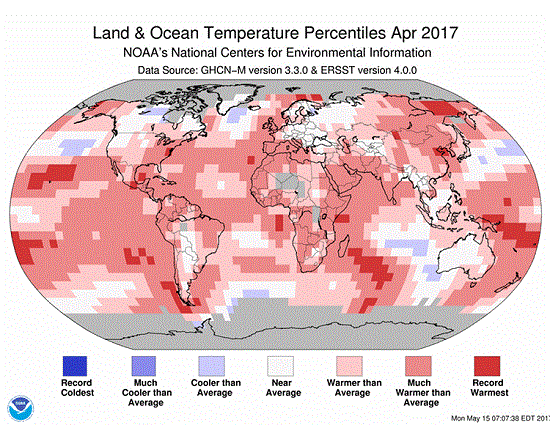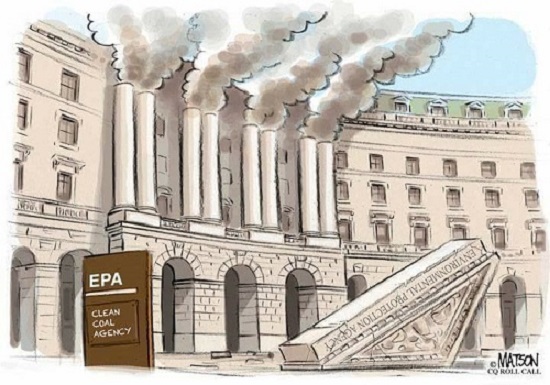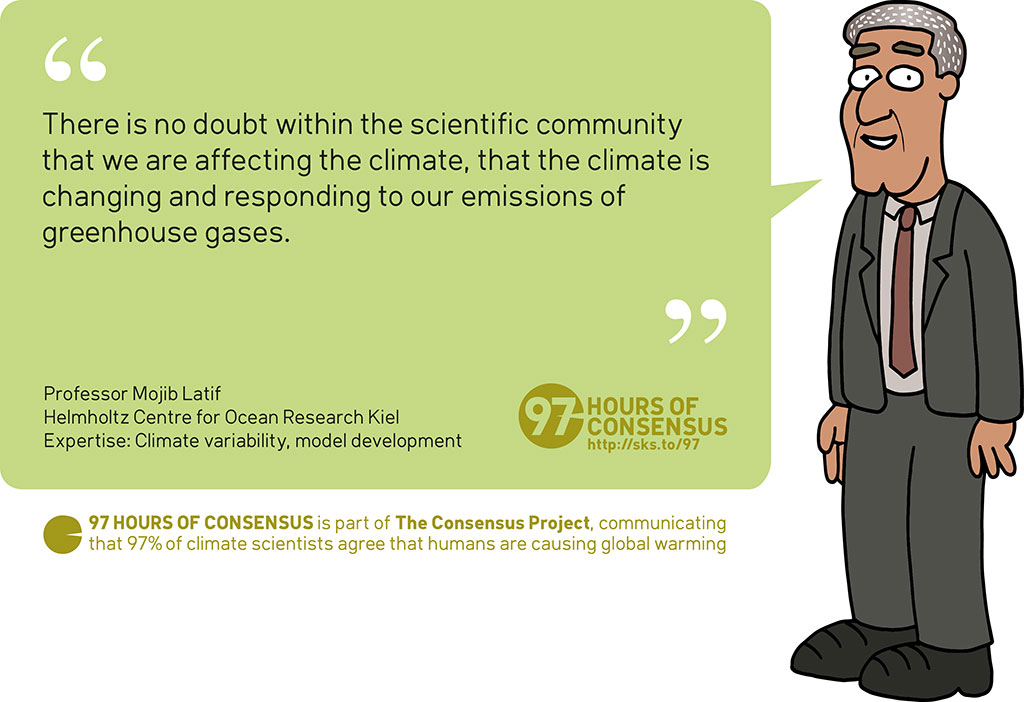2017 SkS Weekly Climate Change & Global Warming Digest #20
Posted on 21 May 2017 by John Hartz
Story of the Week... El Niño/La Niña Update... Toon of the Week... Quote of the Week... SkS in the News... SkS Spotlights... Video of the Week... Coming Soon on SkS... Poster of the Week... Climate Feedback Reviews... SkS Week in Review... 97 Hours of Consensus...
Story of the Week...
April 2017: Earths 2nd Warmest April on Record
April 2017 was the planet's second warmest April since record keeping began in 1880, said NOAA's National Centers for Environmental Information (NCEI) on Thursday; NASA also rated April 2017 as the second warmest April on record. The only warmer April was just last year, in 2016. April 2017 ranked as the eighteenth warmest month (expressed as the departure of temperature from average) of any month in the global historical record in the NASA database. The extreme warmth of January 2017 (thirteenth warmest month of any month in NASA’s database), February 2017 (sixth warmest), March 2017 (fifth warmest) and now April gives 2017 an outside chance of becoming Earth’s fourth consecutive warmest year on record--if an El Niño event were to develop this summer and continue through the end of the year, as some models are predicting. It's more likely, though, that 2016 will remain as the warmest year in Earth's recorded history. For the year-to-date period of January–April 2017, Earth's temperature was 0.95°C (1.71°F) above the 20th century average of 12.6°C (54.8°F). This was the second highest such period since records began in 1880, behind 2016 by 0.19°C (0.34°F.)
Global ocean temperatures last month were the second warmest on record for any April, and global land temperatures were the fourth warmest on record. Global satellite-measured temperatures for the lowest 8 km of the atmosphere were the fifth warmest for any April in the 39-year record, according to the University of Alabama Huntsville (UAH).

Figure 1. Departure of temperature from average for April 2017, the second warmest April for the globe since record keeping began in 1880. Warmer-than-average temperatures during the month were observed across much of the world's land surfaces, with the most notable warm temperature departures from average across the Northern Hemisphere higher latitudes, specifically across much of central and eastern Asia, Alaska and the eastern half of the contiguous U.S., where temperatures were 3.0°C (5.4°F) above average or higher. Image credit: National Centers for Environmental Information (NCEI).
April 2017: Earths 2nd Warmest April on Record by Jeff Masters, Weather Underground, May 18, 2017
El Niño/La Niña Update...
The tropical Pacific Ocean is once again carrying on a will-it-or-won’t-it flirtation with an El Niño event, just a year after the demise of one of the strongest El Niños on record.
The odds right now are about even for an El Niño to develop, frustrating forecasters stuck in the middle of what is called the spring predictability barrier. During this time, model forecasts aren’t as good as seeing into the future, in part because of the very nature of the El Niño cycle.
The reason scientists try to forecast El Niño is because of the major, often damaging, shifts in weather it can cause around the world. The last one brought punishing drought to parts of Southeast Asia and Africa and torrential rains to parts of South America.
An El Niño also helps boosts global temperatures, as it did in 2016, the hottest year on record, and previously in 1998. Global warming, though, means that 2016 was almost 0.5°F (0.3°C) hotter than 1998, even with comparably strong El Niño events.
If another El Niño does materialize this year, it would be only the second time in the records that the Pacific went from the hot phase of an El Niño to the cold phase of a La Niña and then back to an El Niño again within three years. The relatively limited nature of those records, though, means researchers can’t be certain that such a combination is all that rare.
El Niño Again? This Is Why It’s Hard to Tell by Andrea Thompson, Climate Central, May 18, 2017
Toon of the Week...

Quote of the Week...
John DeCicco, a professor at the University of Michigan-Ann Arbor Energy Institute, called the paper “excellent and thoughtful,” but it does not sufficiently recognize that the global carbon cycle already includes carbon removal processes. He said the paper doesn’t sufficiently factor in ways forests and soils could be managed to store more carbon than they do naturally.
DeCicco said that he agrees with the paper’s conclusion that it’s unwise for countries to automatically assume that technology will be developed to bring atmospheric carbon concentrations and global temperatures down to tolerable levels eventually.
“Hoping that future generations might somehow figure out an atmospheric CO2 decline in a way that undoes climate catastrophe is just foolish,” he said, adding that it’s critical for humanity to pursue both emissions cuts and carbon removal technology as quickly as possible.
“We can’t wait for some sort of technological deus ex machina to save us from ourselves," DeCicco said.
Focus on Carbon Removal a ‘High-Stakes Gamble’ by Bobby Magill, ClimateCentral, May 18, 2017
SkS in the News...
The peer-reviewed paper, Neutralizing misinformation through inoculation: Exposing misleading argumentation techniques reduces their influence by J Cook, S Lewandowsky & U Ecker (PLoS ONE) continues to garner considerable attention. John Cook's article about the paper, Inoculation theory: Using misinformation to fight misinformation, originaly published in the he Conversation has been reprinted by numerous publications including: Science Codex, Albany Times Union, Idaho Press-Tribune, Lincoln Journal Star, San Antonio Express News, Houston Chronicle, and Laredo Morning Times.
In her Moms Clean Air Force post, Teachers and Students React to Climate Denial Book Sent to Schools, Katy Farber included the following endorsement of SkS.
The mailing also reached college science professors. Ted Fink, a professor at Marist College School of Science, said this of the mailing:
“The book and DVD was a thinly veiled attempt to impersonate credible scientific research with a mix of misinformation that appeals to economic self-interest and a sense of patriotism. Heartland works hard to make their arguments sound credible. Almost all of their assertions have been debunked. Skeptical Science is a great resource for anyone who has questions about the veracity of Heartland’s claims.”
How to Recognize ‘Science Denial’ is John Cook's critique of Oren Cass's National Review article, “Who’s the Denier Now?”.
In his Vox article, The “fake but accurate” climate change news delivered to Trump? It’s fake all the way down., David Roberts advises readers to check out SkS...
Skeptical Science (a nonprofit educational site) is also a reliable repository of fact-based responses to common skeptic nonsense. Here’s their entry on “what 1970s science said about global cooling.” (Which, according to them, is the No. 7 most-cited piece of climate skeptic mythology.)
SkS Spotlights...

Global Landscapes Forum Paris. Photo by CIFOR
The Global Landscapes Forum is the world’s largest and only science-led multi-sectoral platform designed to produce and disseminate knowledge and accelerate action to build more resilient, climate friendly, diverse, equitable and productive landscapes. The GLF platforms connects diverse stakeholders; provides learning opportunities; gathers and shares knowledge; and accelerates action to produce positive, sustainable impact.
Landscape approaches embrace compromise amongst competing social, environmental, political and economic demands to produce multiple benefits from limited resources. The GLF utilizes this approach around five broad themes; Restoration; Financing; Rights; Measuring Progress; and Food and Livelihoods. The science-led Forum convenes diverse stakeholders—civil society, private sector, policy makers, community members, farmers, indigenous groups, international organizations, and more—to share knowledge and best practice to produce collaborative contributions to achieving the 2030 Agenda.
Video of the Week...
Expert explains link between Extreme Weather and Climate Change (March 2017)
Dr. Kevin Trenberth from the National Center for Atmospheric Research will explore the role of El Niño, climate change, and other influences on the weather and climate, and their role in recent costly and unusual extremes of weather, such as record breaking temperatures, drought and wildfires in the United States and around the world. – Dr. Trenberth will explain how these are linked and what they imply for the future.
Release via https://vimeo.com/211711747
Climate State, May 15, 2017
Coming Soon on SkS...
- Trump's Fox News deputy national security advisor fooled him with climate fake news (Dana)
- SkS Analogy 05 - Linear, Non-linear, and Coastal Flooding (Evan)
- Explainer: Dealing with the ‘loss and damage’ caused by climate change (Carbon Brief)
- Guest Post (John Abraham)
- Mapped: Climate change laws around the world (Simon Evans)
- 2017 SkS Weekly Climate Change & Global Warming News Roundup #21 (John Hartz)
- 2017 SkS Weekly Climate Change & Global Waming Digest #21 (John Hartz)
Poster of the Week...

Climate Feedback Reviews...
Climate Feedback asked its network of scientists to review the article, Global Quackery: Earth Has Not Warmed For Past 19 Years, New Study Finds byJoseph Curl, The Daily Wire May 8, 2017
Eight scientists analyzed the article and estimated its overall scientific credibility to be ‘very low’.
A majority of reviewers tagged the article as: Biased, Cherry-picking, Flawed reasoning, Inaccurate, Inappropriate backing, Misleading.
Click here to access the entire review.
SkS Week in Review...
- 2017 SkS Weekly Climate Change & Global Warming News Roundup #20 by John Hartz
- Study: inspiring action on climate change is more complex than you might think by John Abraham (Climate Consensus - the 97%, Guardian)
- SkS Analogy 4 - Ocean Time Lag by Evan
- Inoculation theory: Using misinformation to fight misinformation by John Cook
- NY Times’ Stephens can’t see the elephant in the room on climate change by Dana Nuccitelli (Climate Consensus - the 97%, Guardian)
- Podcast on National Review & the science of climate science denial by John Cook
- 2017 SkS Weekly Climate Change & Global Warming Digest #19 by John Hartz
97 Hours of Consensus...
































 Arguments
Arguments






























Comments